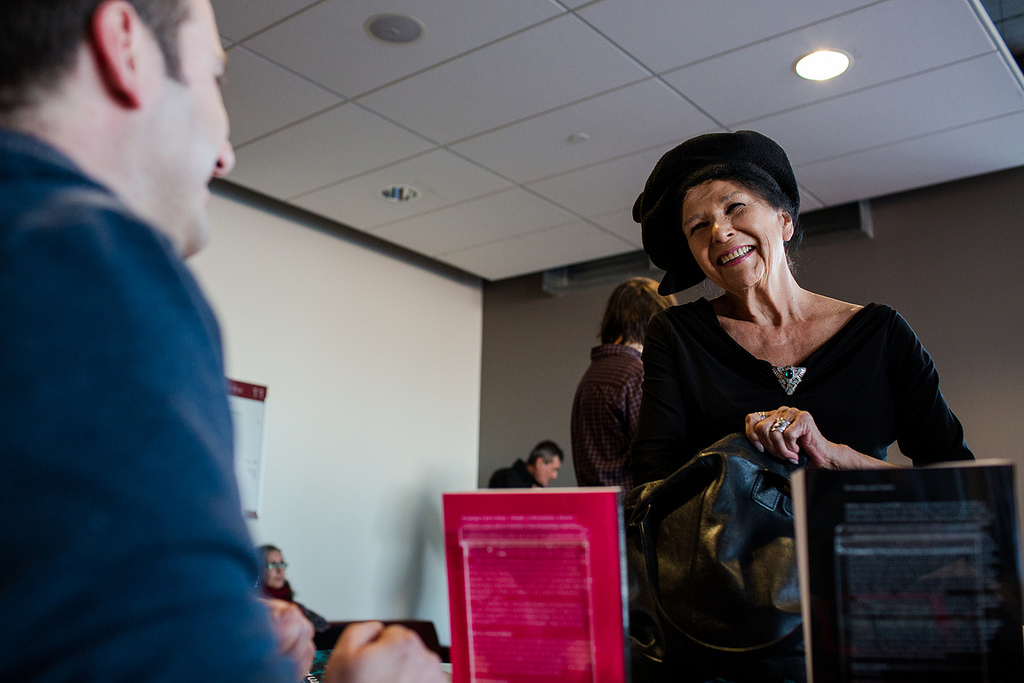Elegant, eloquent, and energetic are words that embody the spirit of Alanis Obomsawin song writer, singer, story teller, visual artist, and documentary filmmaker extraordinaire. At the age of 85, the unimposing activist is reissuing her 1988 album Bush Lady.
The rare, long out-of-print album has been remastered and is being released on 180-gram vinyl and CD with updated artwork and liner notes on June 15th.
Originally born in Lebanon, New Hampshire, Obomsawin moved to Odanak, Quebec with her mother when she was six months old. This was the reservation of her parents’ birth.
Obomsawin is from the Waban-Aki Nation, meaning People of the Sunrise. Originally, their land included all of New England and the Eastern Townships of Canada, including New Brunswick, Nova Scotia and the southern part of Québec. Groups of Waban-Aki people still live in all of these areas.
To people familiar with Obomsawin’s plethora of documentaries — 50 to date, with more coming — it’s often a surprise to learn that singing and story-telling launched her seven-decade career. But, performing on stage did not come easily because, as Obomsawin states in Bush Lady‘s liner notes, “It was hard getting up on stage.” Part of this hesitation comes from the fact that “I can’t read or write music. My traditional singing doesn’t follow those scales. At least that’s what I’ve been told. My purpose is to preserve and maintain the history and culture of where I have been. That’s why I sing.”
Performed in English and French interspersed with Waban-Aki passages, Obomsawin starts the album with “Odana,” a song foretelling the loss of the traditional Waban-Aki land which went unheeded but eventually came true when English explorers arrived.
The second and third songs are “dedicated to all my sisters who live in despair in the skid rows of North America.” A fitting gift to the women and girls living with intergenerational trauma and severed from their traditional ways of life thanks to colonization and the femicide it imposed on First Nations women and girls.
The Indian Act, originally passed in 1876, is a paternalistic government policy crafted to assimilate Indigenous peoples through enfranchisement. Enfranchisement is the legal process for terminating a person’s Indian status in order to impose full Canadian citizenship upon them. Most often, this citizenship was executed without consent and was really forced disenfranchisement.
The act gave government agents the power to enforce government policy, effectively controlling every aspect of the lives of registered Indigenous peoples as well as the reserves they were required to live on. These powers included registering births and marriages; establishing who was eligible for status; and administering punishments when rules were contravened.
The legal dependence of Indigenous women on Indigenous men began in 1851. Indigenous women became non-entities and had their independence stolen because status was directly dependent on having a prescribed colonial relationship with an Indigenous man. This policy birthed the terms Status and Non-Status.
When an Indigenous woman loses her status, she’s denied treaty benefits; health benefits; the right to live on reserve, to inherit family property, and to be buried on reserve with her ancestors.
To this day, First Nations men retain exclusive rights to property even when relationships end. This policy makes it so much more difficult for First Nations women to leave abusive relationships.
According to Obomsawin’s liner notes, “Despite a stated commitment to eliminating discrimination in the Indian Act, there still remain discriminatory provisions.”
“Theo,” titled after Obomsawin’s Aunt Alanis’s partner, retells the destruction and annihilation endured when Rodger’s Rangers massacred almost all the children, women and hunters of the Odanak Nation in the autumn of 1759 while their warriors were fighting at the Battle of the Plains of Abraham.
“NZI WALDAM,” a mere 1:01 minute long, recounts the lamentations of a little girl after the raid destroyed everyone she loved and cared for and the only life she’d known. This is the seventh and last song on the album.
Bush Lady is a recounting of Indigenous experiences with colonization shared through song. But, it is also so much more than that. It’s a gift that offers Indigenous peoples who were robbed of their families, culture, traditions, way of life, spirituality, and connection to Mother Earth a link to the past and an understanding of the paternalistic forces and policies that laid the groundwork for the residential school system and sixties scoop that would follow. This also explains why there have been, and continue to be, so many missing and murdered First Nations women and girls.
Bush Lady is also very much a gift for settlers. These hauntingly melodic songs reveal the lived experiences that can be traced to destructive government policies, a blatant disregard to honour treaty rights, premeditated genocide, and unbridled racism executed against Indigenous peoples across Canada.
Bush Lady offers settlers an opportunity to educate themselves about the horrific truths behind the founding of this nation called Canada. It’s a place from which to move forward and learn more about the treatment of Indigenous peoples, as settlers engage in meaningful dialogue and timely reconciliation with the peoples of these founding Nations.
Make time to be carried away by Obomsawin’s passionate music and compassionate lyrics, for she is truly the most diverse, prolific and timeless artist of our time.
Bush Lady will be re-released on June 15 through Constellation Records. All proceeds from this reissue will go to Obomsawin and to her designated charitable recipient, the Odanak Abenaki Museum.
Image: Flickr/cinemapolitica
Like this article? Please chip in to keep stories like these coming.





